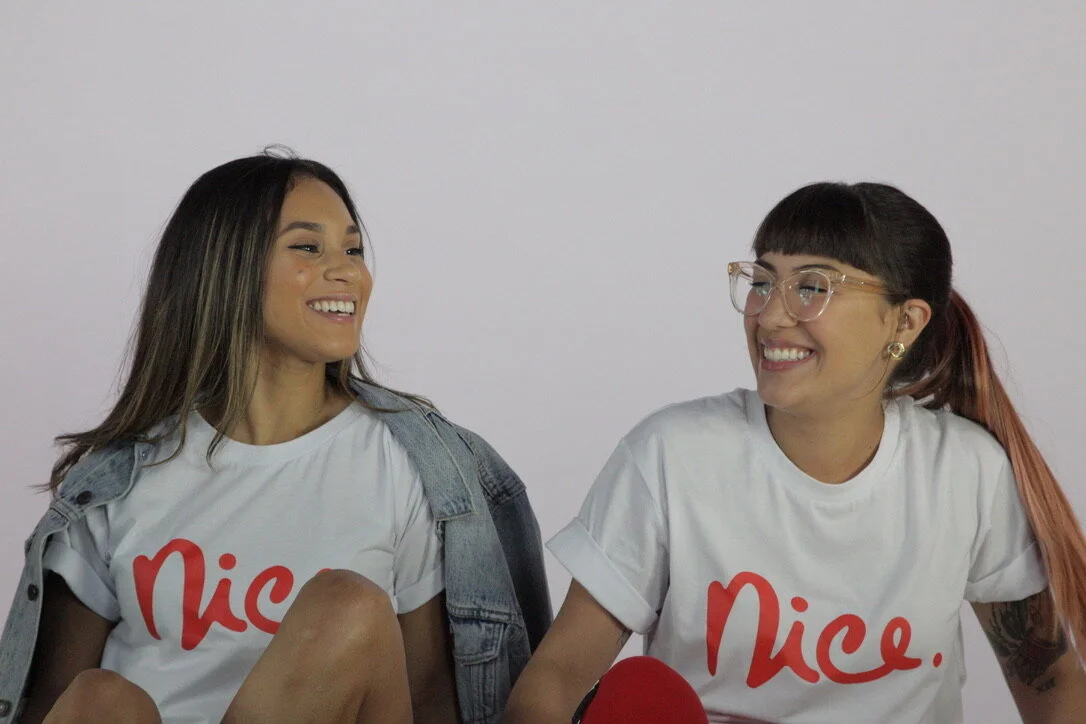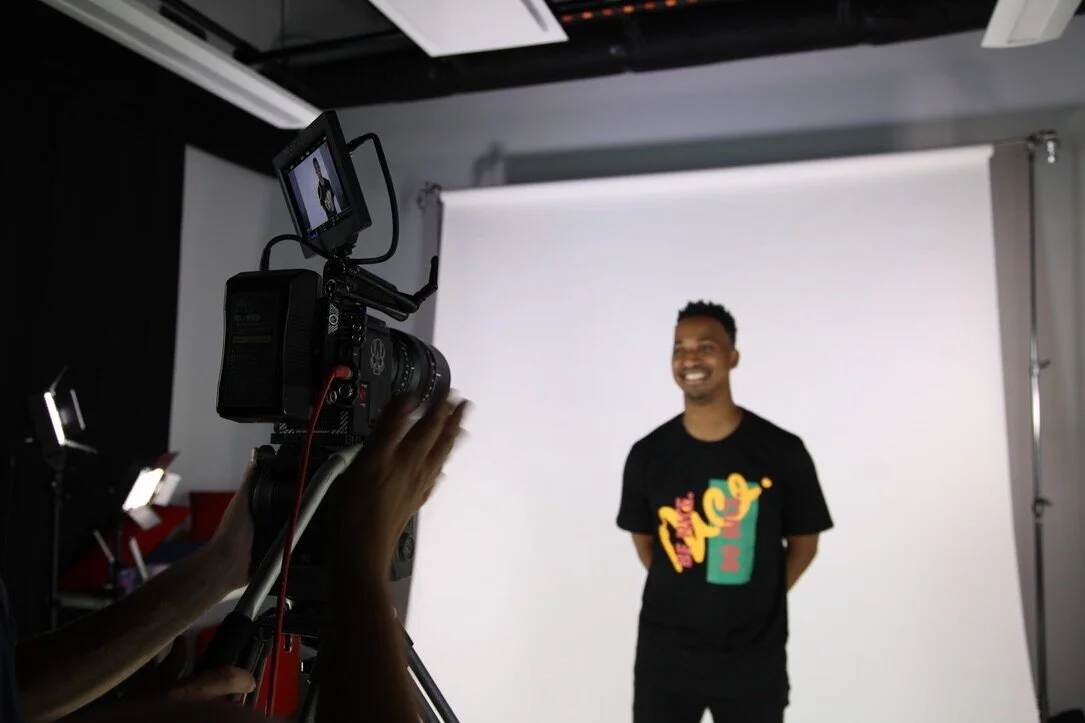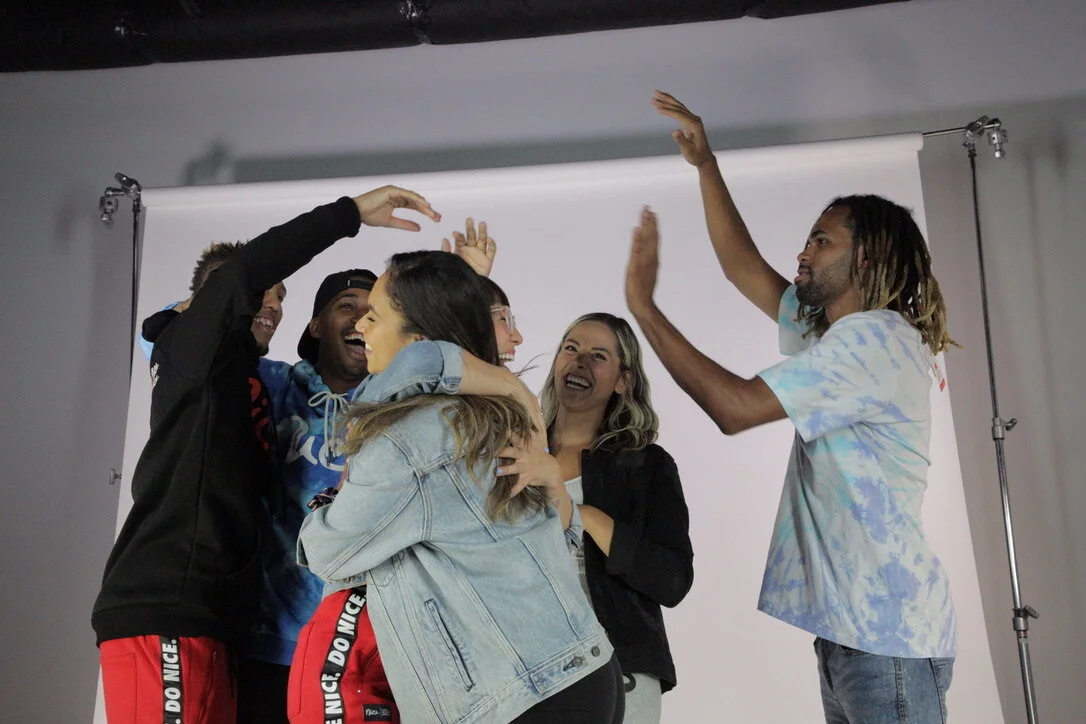Behind The Project: Vertical Video x Live Life Nice
Hey! Morgan here, Editor at Koi-Fly Creative. I’m here to talk to you about the newest, biggest trend in content creation – vertical video – and how I edited a recent project for Christian Crosby, In-Arena Host for the Philadelphia 76ers and creator of the Live Life Nice brand and clothing line which includes sweatpants, t-shirts and hoodies.
It’s Here.
It’s official – vertical video is in. The stats are astounding and are continuing to rise day by day. Around 81 percent of Americans own a smartphone, and an estimated 51 percent of Americans currently use smartphones as their primary means of online access. Out of all those smartphone owners, 94 percent hold their phone vertically whether it’s for texting, calling, banking, scrolling through news feeds and more.
The reason so many brands and social platforms are jumping on the vertical bandwagon is because they want their viewers to stay engaged with their content as long as possible. Instagram is a key player in this new phenomenon. Instagram’s newest feature, IGTV, allows any user to post video content up to 10 minutes long, and up to one hour long for larger or certified accounts. Instagram’s Story feature is also a great way for users to post vertical video.
Vertical Video and Retail
The main way retail companies are selling their products on social media is through video, especially on IGTV and Instagram stories. Koi-Fly partnered with Christian to create videos that would be posted on Live Life Nice’s Instagram Stories and IGTV to highlight the collection. Christian’s personal Instagram account has a large following, which only helps with promoting his new line because he can reach over 80,000 people and even more when his followers share his content with their followers. So what better way to showcase his new line than creating short, creative videos of people wearing his clothes? The videos will drive more traffic to his website – especially with the “Swipe Up To Shop” option on each video posted on IGTV.
Shooting Format/Style
Before we filmed for Live Life Nice, our producer Leslie Schmidt generated different ideas and concepts for the best way to feature the clothing.
“It’s fun and challenging taking vertical space and thinking of new creative ways of using the anticipated margins. We shot everything horizontally, but had wireframes on the screen set with the specs for vertical video (9:16). This allows us to have more material and creativity when it comes to editing in the vertical space,” Leslie said.
We anticipated shooting the videos in a way that made them more engaging to the eye rather than having just a single person mid shot in front of the camera. Landscape video allows for the rule of thirds where the subject can be set off slightly to the side, making the composition look amazing.
Vertical video doesn’t have the same exact rules as landscape video, so you have to think of other ways to make the viewer’s eye move in the limited space. The more content shot, the more unique and visionary ideas come out of an editor’s mind and into the videos he or she creates.
Editing Process
I was the lead editor on this project, and once I got the hard drives I started the process of looking through the footage to see what I had to work with. What made the footage particularly interesting were the models – they were from the 76ers Dunk Squad, so I had full range to get creative with the flips, headstands and spins they performed on set. This created more visual effects, making the edits more interesting and visually appealing. My gears started turning and I visualized how I could place each clip in the vertical frame to make it just as engaging as landscape videos. What takes a video project to the next level is the perfect selection of music; this is where the music selection process is key.
Music Selection
I wanted a piece of music that had some hard hitting beats, but also subtle moments for a diverse experience. I searched on Artlist, a music licensing website, selected Fashion as the style, Playful as the mood, and Pop Music as the genre and stumbled upon “Our Summer” by Anton Vlasov. It had the perfect mixture of Christian’s personality and the street style vibe he created with his collection.
The Live Life Nice line is unisex, which made me think that there should be a different subject matter for each video. I dedicated the first video to just the men, the second to the women, and grouped everyone together in the last two videos. This way, if Live Life Nice created a campaign focused on increasing sales within the female demographic, they’d be able to utilize the women-only video to market to that target audience (and vice versa for men). After I found the music and decided on the theme for each video, it was time to get down to the nitty gritty.
Speed is Key
Speed is the key when it comes to Instagram stories. Fast cuts, motion on or across the screen, and special effects catch a person’s eye, which keeps their interest and the story moving. Each section of music I picked out for the videos started out with a punch, followed by a fast tempo ramp up with short clips cut to the beats to add some drama, allowing a story arc, and then ended with a big finish.
In the All Together Now video with the men and women in the same shot, the middle of the song starts to build up, hitting a new beat every second, which created a climax in the story. The beats of this section of music reminded me of a rocket shooting off, so I took that inspiration and picked 15 different clips of individuals, couples and group shots to cut each piece to the build up of beats. Check out what I mean below.
Horizontal Video in a Vertical Video?
Even if a video format is vertical, you can still incorporate horizontal shots into the frame. Thanks to Leslie and the rest of the film crew’s shooting format, I was able to combine vertical and horizontal video into the same piece. Horizontal video utilizes all of the space on the left, right, top and bottom, allowing more space for action shots.
For example, in the screenshot on the left, the model is doing a one-handed kickstand. If this motion was shot vertical, his legs would be cut off and you wouldn’t be able to see the full trick. Some actions work better horizontally rather than vertically. This video was only 20 seconds long, so if we had one person on screen vertically the entire time it would be very boring.
I made the horizontal portions more engaging by splitting the screen into two or three sections to display the same piece of footage two/three times. This allows room for more engagement and a different point-of-view for people to analyze and allow their eyes to explore the vertical screen.
For example, the image on the right has three sections of the same shot of Christian doing various hand gestures, making the video more fun and interesting to the human eye.
Combining Horizontal and Vertical Shots
A common video edit is splitting a frame in half horizontally, but who wants to be ordinary? Why not split it vertically? Visually, it looks cool and it changes the perspective of how people view visual content. I also haven’t seen it been done by many brands who use vertical video. Fast cuts and split screens can only take the video so far; you have to get creative. Splitting a clip into four corners on the screen (shown below) and combining horizontal and vertical videos on the same screen shakes up the typical edits people see on a retail company’s Instagram. The mixing and matching creates thumb-stopping content, stopping people from scrolling to the next post.
Open and Close With Your Brand
Integrating brand elements into the first and last few seconds of your video helps viewers identify and understand who the message is coming from. For each Live Life Nice video, I used a different ending to reveal the brand name. I made sure that the brand name, slogan and logo were prominent whether it was displayed on a shirt, pants, clothing tags or a jacket. Starting and finishing with the brand name is important because repetitiveness ensures people will have it ingrained in their brain. If the name only pops up in the beginning of the video, people will forget whose video it is after taking in all of the information from start to finish.
Time Remapping – It’s All In the Detail
I do have a little extra tidbit from my edits. I added a unique effect to some of the clips in the videos, called time remapping. Time remapping allows you to speed up and slow down different parts of a clip to add a unique visual effect. Doing this adds an extra flare to your videos and makes you stand out from all of your competitors. I got the idea to use this effect on some clips after finding the clip I used to end the Gurl Power video (see below). The clip starts off with a jacket being tossed and caught by the girl on screen, and then she spins and walks off. I noticed her t-shirt had one of the Live Life Nice catch phrases on the back, and that immediately sparked the idea to end this clip with revealing the brand name while adding the time remapping effect onto it. I ended up having her catch the jacket normal speed, slowing it down when she turns with the jacket on her shoulders, then speed it up when she walks off the screen while her jacket reveals the text. It’s a creative way to display the clothing line and a perfect way to end a video with a bang. This little flare can wow your viewers and push them to become customers with a simple swipe of their finger.
Revisions/Fine Cut
Once I finished all of the videos, we sent them to Christian to review for notes. The revision process can usually take two to three revisions, but luckily for us Christian loved each video. After getting the approval from the client, the videos go into fine cut. In fine cut, I completed a final audio and color pass to make them all cohesive and look pristine. Once everything was finalized, we sent the videos to the client to post on their website and social media platforms, with our marketing recommendations. Check out the final videos below!
The Future is Vertical
Vertical video is the future and the future is now. It’s faster and easier for brands to connect with their audience to market their products, especially through social media.
Many people think vertical video limits creativity to a small space, affecting how you can fit and shoot content in the frame. Unlike horizontal video, vertical video does have less space on the sides to work with, but this is only a minor speed bump. This minor speed bump makes us pivot our creative process and helps our minds explore uncharted territories. Vertical video makes you think of different vantage points for displaying content that hasn’t been done before.
More than 55 percent of people use stories on at least three platforms, at least once a week. Smartphones aren’t going anywhere anytime soon, so brands are adapting to their audiences’ new viewing habits. And you should, too.









